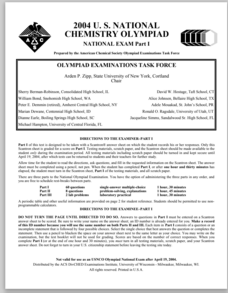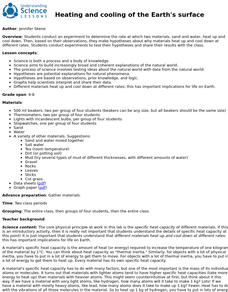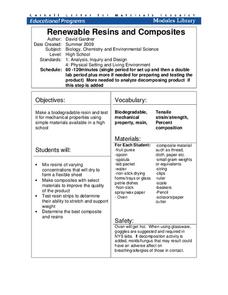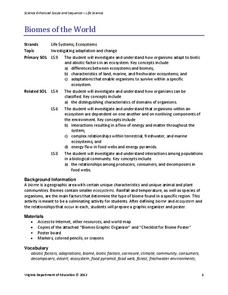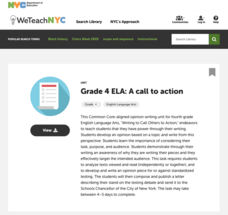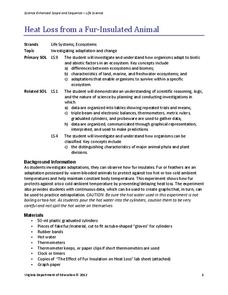Curated OER
2004 U.S. National Chemistry Olympiad Exam Part II
In this National Chemistry Olympiad test, junior chemists answer eight problem solving questions on a variety of topics. These include calculating molarity of solutions, determining rates of reactions, calculating decay and discussing...
Curated OER
2004 U.S. National Chemistry Olympiad Part I
In this chemistry worksheet, test takers answer 60 multiple choice questions on topics related to chemistry from balancing equations to calculating moles and molecules of compounds. They name formulas, they convert, they solve problems...
University of California
Heating and Cooling of the Earth's Surface
Scholars collect data from heating sand and water before forming testable hypotheses about why sand heats up faster. Afterward, they develop and run experiments to test their hypotheses.
Polar Trec
Animal Monitoring Introduction
Not only do mealworms taste great, they are also great for classroom science lessons. In pairs, young scientists observe and record what they see as they check out what their mealworms are doing from minute to minute. Each minute...
Curated OER
Cholera and the Scientific Method
Five individuals in the class are "infected" with cholera! The rest of the class serves as investigators to discover the source of the outbreak. They test drinking fountains around campus for contamination. You, of course, will secretly...
Cornell University
Renewable Resins and Composites
Merge chemistry with environmental science to study biodegradable materials. An engaging activity allows learners to experiment with different resin concentrations and composites. Through experimental tests, scholars test their creations...
Curated OER
Building for the Big One
Students build and test structures that can best withstand earthquakes. They create their structures from playdough, cornstarch, grape-nuts and popsicle sticks and place their structures on a "shake table."
Center for Learning in Action
Density
Explore the concept of density within states of matter—gases, liquids, and solids—through a group experiment in which young scientists test objects' texture, color, weight, size, and ability to sink or float.
Columbus City Schools
Thinking Like A Soil Scientist
Ready to roll up those sleeves and get your hands dirty? Dirty with soil science content, that is! Overcome those "But it's just dirt" objections with a trip outside to collect soil samples for some in-class analysis. Use the...
It's About Time
Identifying Matter
High schoolers test wood splints that have been soaked in mystery solutions to identify the different colors it produces when lit. The lesson concludes with a reading passage and analysis questions.
Towson University
The Wildlife Forensics Lab
Can science put an end to the poaching of endangered species? Show your young forensic experts how biotechnology can help save wildlife through an exciting electrophoresis lab. Grouped pupils analyze shark DNA to determine if it came...
Curated OER
Galileo and the Inevitability of Ideas
Students research Galileo's work and contributions to science. They make a timeline of Galileo's life, discuss the historical context for his book "Dialogue on the Two Chief World Systems" and examine his trial by the Inquisition for...
Virginia Department of Education
Biomes of the World
Incorporate knowledge about biomes and ecosystems in multiple ways while encouraging creativity. Emerging ecologists collaborate and perform research to complete a graphic organizer about various biomes of the world. They conclude the...
New York City Department of Education
Grade 4 Literacy in English Language Arts: A Call to Action
You have the power! Scholars learn that they have power of the pen in their writing. After reading and viewing various sources about standardized testing, they express their own opinions about the testing by writing letters to the...
Virginia Department of Education
Changes in Ecosystems
How does water pollution affect the environment? Provide your class with the resources to answer this question as they learn about eutrophication and ecosystem changes. Over two weeks, they simulate the effects of pollution on the...
Virginia Department of Education
Acids and Bases
What did one titration say to the other titration? We should meet at the end point! Young chemists perform four experiments: dilute solution, neutralization, titration, and figuring pH/pOH.
Virginia Department of Education
Heat Loss from a Fur-Insulated Animal
How do animals adapt to weather changes? Provide your class with the ability to understand adaptations and body temperature as they participate in this hands on experiment, using fake fur and hot water. Pupils collect data and...
Teach Engineering
Alloy the Way to Mars
Future engineers test different alloys to determine the specific strength of each one. Based on the results, they make a recommendation to NASA on which alloy to use on engines for spacecraft.
Teach Engineering
Rock Candy Your Body
Candy rocks! A sweet lesson offers a different take on the rock candy experiment. Groups use a supersaturated sugar solution to create rock candy. Pupils then add other ingredients to the solution to test their effect on the...
Curated OER
Energy Efficiency Ambassadors
High schoolers research energy conservation devices. They also create their own light efficiency project and presents their findings on science fair night.
Science Friday
Capturing Carbon Dioxide
Why don't we just capture carbon dioxide in the air and store it somewhere else? A hands-on lesson allows scholars to explore a complex concept. First, they will create a carbonated beverage, and then they will determine...
Teach Engineering
Magnetic Fluids
Teams work as material engineers to create ferrofluids, whose shape is influenced by magnetic fields. The activity, which is the fourth in the six-part series, has the teams create magnetic ink and use it to write, testing it with a...
PBS
Predicting/Making a Hypothesis
As an introduction to the hypothesis and testing method of investigation, young history detectives engage in a special investigation of a family artifact. After watching a short video that demonstrates the method, they develop a...
Curated OER
Making Predictions About Measurement
Upper graders experiment with measurement. They estimate the length, volume, and weight of various objects, then rotate through stations making predictions concerning measurements and then testing their predictions.
Other popular searches
- Science Test Preparations
- Science Test Preparation 2
- Primary Science Fair Testing
- Fair Testing Science



